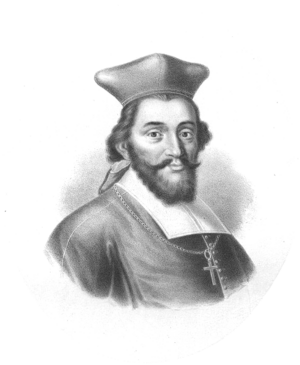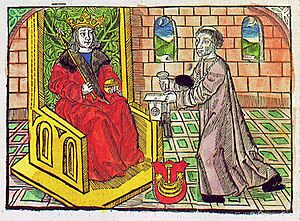Jan Łaski (1456–1531) facts for kids
Quick facts for kids Jan Łaski |
|
|---|---|
| Archbishop of Gniezno Primate of Poland |
|
 |
|
| Enthroned | 1510 - 1531 |
| Personal details | |
| Born | 1456 Łask, Kingdom of Poland |
| Died | May 19, 1531 Kalisz, Kingdom of Poland |
| Coat of arms |  |
Jan Łaski (born in Łask in 1456, died in Kalisz, Poland on May 19, 1531) was an important Polish nobleman. He served as a Grand Chancellor of the Crown from 1503 to 1510. He was also a skilled diplomat. From 1490, he worked as a secretary for King Casimir IV Jagiellon of Poland. Later, in 1508, he became a helper (called a coadjutor) to the Archbishop of Lwów.
In 1510, Łaski became the Archbishop of Gniezno. This made him the Primate of Poland, which was the highest church leader in the country.
Contents
Jan Łaski's Life and Career
Jan Łaski was the uncle of another famous person with the same name, John à Lasco. His nephew was a well-known Protestant reformer. John à Lasco helped change the Church of England. He was also asked by King Sigismund II to bring similar changes to Poland.
Becoming a Priest and Secretary
Jan Łaski became a priest. In 1495, he started working as a secretary for the Polish chancellor, Zawisza Kurozwęcki. This job helped him gain influence and experience. The older chancellor trusted the smart young church leader with important tasks.
He traveled to Rome twice, in 1495 and 1500. He also went on a special trip to Flanders. He wrote about his journey to Flanders. On these trips, he showed great talent as a diplomat.
Working for the King
When Alexander Jagiellon became King of Poland in 1501, he did not know much about Polish affairs. He mostly lived in Lithuania. The senate chose Łaski to be the king's secretary. In this role, he successfully stopped parts of Lithuania from trying to separate from Poland. He also helped keep the influence of Catholicism strong there.
Serving as Chancellor of Poland
The king was very impressed by Łaski's skills. When the Polish chancellor died in 1503, the king chose Łaski for the important role. He became the Grand Chancellor. As chancellor, Łaski supported the szlachta, who were country-gentlemen. He even passed a rule that stopped common people from getting high church positions.
Even so, he was such a good public servant that the new king, Sigismund I, made him one of his main advisors.
Becoming Primate of Poland
In 1511, Jan Łaski was still a canon (a type of priest) in Kraków. But he then received the important title of Archbishop of Gnesen. This also made him the Primate of the Polish church.
Łaski helped King Sigismund a lot during talks with the Teutonic Order. This group was often rebellious. Łaski suggested that King Sigismund should become the grand master of the Order. He also suggested that Łaski himself would give up his church position to the knights' new leader, Albert, Duke in Prussia. This idea would have helped Poland more than what eventually happened in 1525.
In 1513, Łaski went to the Lateran Council. This was a big meeting called by Pope Julius II. His job was to speak for Poland against the knights. He was excellent as a speaker and a diplomat. This trip helped both his country and himself. He managed to get the Pope to give the Archbishops of Gnesen the special title of legati nati. This meant they were the Pope's representatives in Poland.
In his later years, Łaski favored his nephew, Hieronymus Jaroslaw Łaski. This led him to support John Zápolya for the Hungarian crown. Zápolya was supported by the Turks. Łaski's strong support went against the Habsburgs. Because of this, he faced a serious disagreement with Pope Clement VII, which led to him losing his church position. This difficult situation contributed to his sudden death in 1531.
Jan Łaski's Writings
- Commune incliti Poloniae regni privilegium (1506; also known as Łaski's Statute; in Polish, Statut Łaskiego)
Collections of Church Laws
- Statuta provincialia (1512)
- Sanctiones ecclesiasticae tam expontificum decretis quam ex constitutionibus synodorum provinciae excerptae, in primis autem statuta in diversis provincialibus synodis a se sancita (1525)
- Statuta provinciae Gnesnensis (Kraków, 1527)
- De Ruthenorum nationibus eorumque erroribus (Nuremberg)
See also
- List of Polish people § Religion
 | Janet Taylor Pickett |
 | Synthia Saint James |
 | Howardena Pindell |
 | Faith Ringgold |


